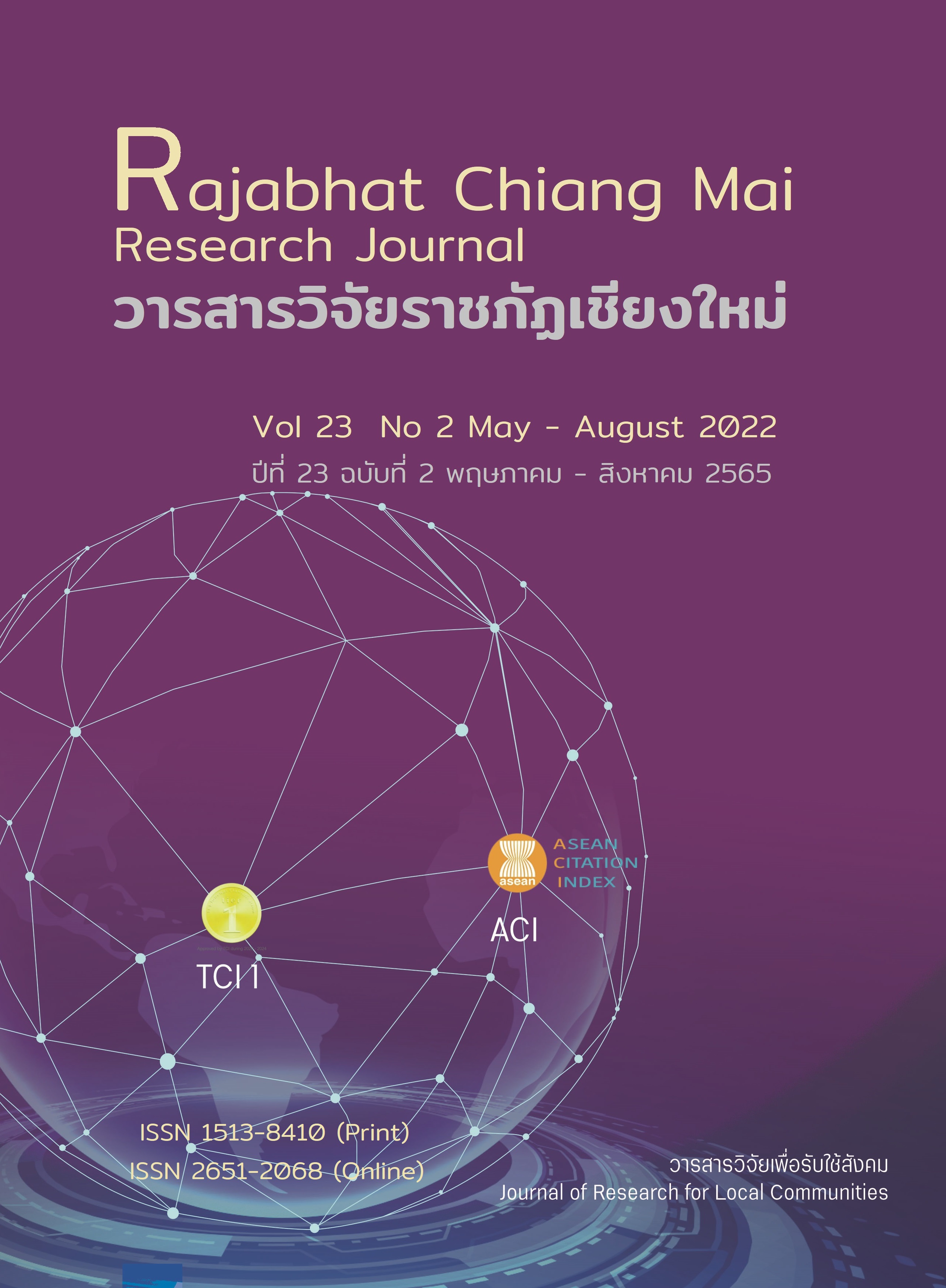The Results of Using the Teaching and Learning Management Model According to the Educational Guidelines Multicultural Perspectives of Teachers in Multicultural Classrooms
DOI:
https://doi.org/10.14456/rcmrj.2022.247564Keywords:
Learning management, Multicultural classroom, Multicultural educationAbstract
The goal of this research was to examine the impact of instructors in multicultural classrooms utilizing the learning management model in accordance with their multicultural education approach. This study is in the creation stage and draws heavily on the James (2001) idea and the primary conceptual framework of multicultural education. The sample group consisted of instructors in the lower secondary school of three groups of learning disciplines, the research site was an opportunity expansion school in the province of Phayao. Including, Thai language subject, social studies subject religion and culture, and academic career and technology, totaling 9 people, use purposive sampling method. The instruments used in the research were 1) a form to assess the suitability of the components of the teaching and learning model based on the concept of learning management that emphasizes the differences between individuals according to the approach to multicultural education, and 2) appropriateness assessment form for teaching and learning manuals in accordance with multicultural education guidelines to assess the composition of the instruction manual and learning management plan. Both assessment forms are a 5-level rating scale that was assessed by 3 experts to determine the content validity by calculating the index of conformity (IOC). All returned questionnaires and assessment forms were used to check the accuracy of the questionnaire and assessment responses, and data on problem conditions and learning management effectiveness were analyzed in accordance with recommendations for multicultural teacher education, the data were statistically analyzed. According to James (2001), the idea of multicultural education is divided into five dimensions, it was discovered that the teacher's learning management model and the development of learners in the multicultural classroom, teachers have a strong awareness of multicultural education based on the concept of different dimensions. In terms of content integration, knowledge building processes, bias reduction, educational equality, and in terms of enhancing the potential of the patterns practiced within the school. These findings are utilized to inform multicultural education, which is a concept that begins with giving each student significance. In order to eliminate prejudice and create a multicultural society in the classroom, it must offer a learning environment that is equitable in nature.
Downloads
References
Assalihin, S. (2010). The effect of applying the module lessons on religion according to the concept of multicultural education on Academic achievement of grade 5. Students at the Graduate School Islamic University Yala. (In Thai)
Banks, J.A. (2001). Approaches to multicultural curriculum reform. In J. Banks and C.Banks (Eds), Multicultural Education: Issues and perspectives. Boston: Allyn & Bacon. Hargreaves et al. (Eds.). The International handbook of education change (Vol. 1, pp. 418-419). Berlin: Springer, Dordrecht.
Banks, J.A. (2007). School reform and student learning: A multicultural perspective. In J.A Banks & C.A.M. Bank (Eds.), Multicultural education: Issues and perspectives (6th edition) (pp. 425-443). Hoboken, NJ: John Wiley and Sons Inc.
Bunyaphithak, S. (2015). Progress Report Document for Student Teacher Development Innovation Project for Strengthen learning management capacity for coexistence. Bangkok: Fund Office Research Support (TRF). (In Thai)
Dechchanakorn. K. (2020). Sexual stigma against transgender students in Chiang Mai. (Doctor of Philosophy field of study (Multicultural Studies), Graduate School, Chiang Mai University). (In Thai)
Inrak, C. (2014). Education management in multicultural society for tribal children in primary schools. Northern border area. Faculty of Education Bangkok. Thonburi University. (In Thai)
Leepreecha, P., & Sakboon, M. (2016). Policies and management of government education towards indigenous peoples in Northern Thailand. Chiang Mai: Department of Social Sciences and Development Faculty of Social Sciences Chiang Mai University. (In Thai)
Pilanthananon, N. (1994). The development of global citizenship. Compilation of the subject matter series. Nonthabur.: (Graduate Studies, Department of Education, Sukhothai Thammathirat University). (In Thai)
Pinla, W. (2016). Guidelines for enhancing the capacity of learning management in social studies for coexistence in multicultural society for teachers in the 21st century. Veridian E- Journal, Silpakorn University, 9(1), 1443-1458. (In Thai) https://he02.tci-thaijo.org/index.php/Veridian-E-Journal/article/view/61855
Ruangsri, S. (2020). Practice building teachers into multicultural classrooms. (Doctor of Philosophy Program in Education (Multicultural Studies), Graduate School, Chiang Mai University). (In Thai)
Wachiraprakarnpong, P. (2009). Joint learning arrangements for children with special needs in schools under the Office of Secondary Education Service Areas in Bangkok. (Master of Education Program Education Management, Dhurakij Pundit University). (In Thai)
Downloads
Published
How to Cite
Issue
Section
License
Copyright (c) 2022 Rajabhat Chiang Mai Research Journal

This work is licensed under a Creative Commons Attribution-NonCommercial-NoDerivatives 4.0 International License.
1. Articles, information, content, images, etc published in the “Community and Social Development Journal” are copyrighted by the Community and Social Development Journal, Chiang Mai Rajabhat University. In order to properly distribute the articles through print and electronic media, the authors still hold the copyright for the published articles under the Creative Commons Attribution (CC BY) license, which allows the re-distribution of the articles in other sources. References must be made to the articles in the journal. The authors are responsible for requesting permission to reproduce copyrighted content from other sources.
2. The content of the articles appearing in the journal is the direct responsibility of the article authors. The editorial board of the journal does not necessarily agree with or share any responsibility.














